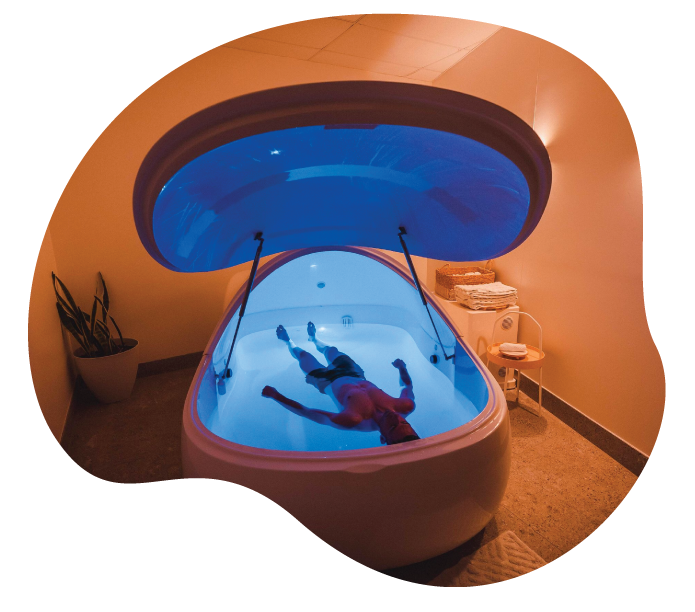Dive into Relaxation and Wellness: Discovering the Amazing Benefits of Float Therapy (aka Sensory Deprivation Therapy) for Pain Relief, Sleep Quality, and More


Grant Ian Gamble is a best-selling mindful leadership author and speaker. He has over 30 years of experience in leading teams to create innovative customer experiences, building engaged workforces, and developing leaders who prioritize mindfulness in their approach.
What is Float Therapy or Sensory Deprivation Therapy?
Float therapy, also known as sensory deprivation therapy, is a type of treatment that involves floating in a tank or pool filled with salt water. This therapy has gained popularity in recent years as a way to promote relaxation and wellness. In this article, we will explore what float therapy is and the benefits it offers.
Float therapy involves floating in a tank or pool filled with salt water. The water is heated to body temperature and contains a high concentration of Epsom salts, which allow the body to float effortlessly.
During a float therapy session, the patient lies down in the tank or pool and floats for a designated period of time. The therapy is designed to be a relaxing and meditative experience.
Benefits of Float Therapy or Sensory Deprivation Therapy
- Relaxation
Float therapy can promote relaxation by reducing stress and anxiety. The therapy can stimulate the production of endorphins, which are natural mood-boosting chemicals produced by the body.
- Pain Relief
Float therapy can provide pain relief for various conditions, including arthritis, fibromyalgia, and back pain. The therapy can help to reduce inflammation and promote healing.
- Improved Sleep
Float therapy has been shown to improve sleep quality by promoting relaxation and reducing anxiety. The therapy can also stimulate the production of melatonin, a hormone that regulates sleep.
- Enhanced Athletic Performance
Float therapy has been shown to enhance athletic performance by reducing muscle soreness and improving recovery. The therapy can increase blood flow and oxygenation to the affected area, allowing the body to recover more quickly.
- Improved Mental Health
Float therapy has been shown to improve mental health by reducing symptoms of depression and anxiety. The therapy can promote relaxation and provide a sense of calm and well-being.
Float therapy is a safe and effective treatment that offers a range of benefits for various health conditions. This treatment can promote relaxation, provide pain relief, improve sleep quality, enhance athletic performance, and improve mental health. If you are considering float therapy, it is important to consult with your healthcare provider to determine if it is a suitable treatment option for your specific condition.
Your Ultimate Recovery Guide: Unlocking the Secrets to Peak Performance, Health and Well-being

Put PEOPLE FIRST, ALWAYS and watch your business flourish.
Dive deep into the latest trends in customer experience and team engagement, mindful leadership and management. Discover practical tools and strategies that you can use to build a people-centric culture, the foundation for sustainable long-term business growth and success.
Led by mindful leadership expert, Grant Ian Gamble, a best-selling author and true visionary with over 30 years of experience in leading teams to create innovative customer experiences, building engaged, inspired and fulfilled workforces, and developing leaders who prioritize genuine connection in their approach.
The guiding principle behind all of Grant’s work is PEOPLE FIRST, ALWAYS.
More Articles:
The Office is Where Your Laptop Is
Similarly to the migration of retail to online, COVID has provoked a transition of thinking about where team members actually need to physically be in order to do their job well.
As we adjust our perceptions of what work looks like post COVID, there exists a gulf between what was and what will be when it comes to office geography. Companies have already begun divesting themselves of offices and buildings they formally saw as essential in order to house their workforce. Conference rooms lie dormant and have been replaced by Zoom calls. The office phone system has similarly been replaced by cell phones, text messages and FaceTime.
How to Improve Your Quality of Life by 33% Today
I touched on the importance of sleep in my article, “Three Foundations & The First Step Toward Mindful Leadership.” As I explained in that piece, quality sleep is one of the central foundation stones of optimal physical and emotional health. And yet it is underrated by some, and elusive for many.
As with many things, getting great sleep can be a process.
The first step in this process is truly understanding, and appreciating, the importance of sleep to our health and emotional wellbeing.
How to Achieve the Ultimate State of Wellness
That title should raise some red flags for you immediately.
I mean, who can predict what it would take to achieve the ultimate state of wellness for any individual?
There are commonly held beliefs, a great deal of science and a plethora of information available on the achievement of aspects of wellness, but “The Ultimate State of Wellness”? That’s a very individual and ethereal thing.
Fill out the form below and receive a PDF download of "6 Key Strategies to Engage Untapped Fitness and Wellness Market Segments"
Let's Connect!
CUSTOMER EXPERIENCE, TEAM ENGAGEMENT & WORKPLACE WELL-BEING: AFFINITY OS™ | WELLNESS INTEGRATION | MINDFUL LEADERSHIP: "THE AFFINITY PRINCIPLE"
0475 866 592

The Affinity Principle™ by Grant Gamble presents a formula for business success through a people-centric, mindful leadership approach.
PEOPLE FIRST, ALWAYS.








